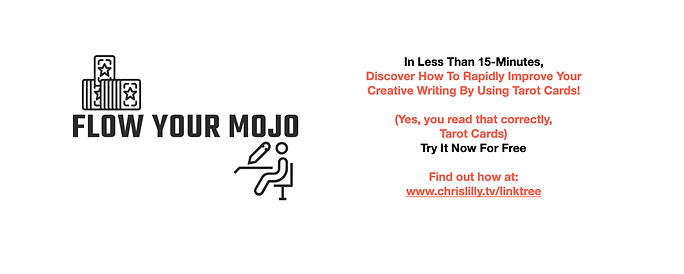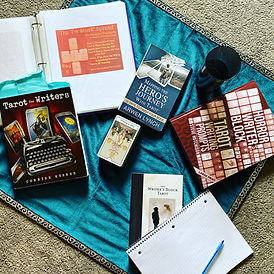

826LA / Hammer Museum Workshop
Flow Your MoJo: Connecting to Your Authentic Writer's Voice through Tarot Cards
Grades: High School (Possibly Middle School)
Subject: Creative Writing
Time Required: 2 Hours
Instructor: Chris Lilly
Lesson Overview:
Creative Writing should be a magical experience, but with all the distractions of school, homework, social media, part-time jobs, family obligations, chores, extra curricular activities, friends, and hormones, amongst other distractions, how are writers supposed to get into this magical state, something I like to call flow.Contrary to popular belief, tarot cards are not evil. In reality, the tarot is a tool. A tool that can be used to access the deep, inner psyche of it’s user to better understand themselves. Using the tarot, along with writing prompts to help access the five senses (or more), writers can have the ability to create stories that will keep readers reading from the first page. Every writer’s voice is unique and tarot cards can help a writer discover their own individual authenticity, no matter what stage of the writing process the writer is at or level of experience.
Note:
This is not a tarot workshop. Though the meanings of some of the cards will be discussed, this workshop is designed to help the students access their intuition, not teach them how to read the cards.
Lesson Objectives:
Students will be able to:
-
Write a complete story, beginning, middle, and end by the end of the workshop
-
Get into a start of creative flow and access their intuition
-
Learn/Add another writing utensil to their tool box
Materials/Learning Tools
For students:
-
Personal laptops with a program like Microsoft Word on it
-
Notebook, or 10 sheets of lined paper
-
Pen / Pencil
-
Tarot Prompt Worksheet — I can send this to you to provide, or I can provide
For instructor:
-
Projector — it’s not 100% necessary as I can work around it
-
Tarot Deck(s) — I have them
Lesson Breakdown
I. Introduction and Icebreaker (5 minutes)
-
Go around and do introductions
-
Ask students what their relationship with their writing and intuition is and if they’ve ever used tarot cards
II. Introduction to Popular Writing Structures and Modalities (5 minutes)
-
The Hero’s Journey
-
Save the Cat
-
Three Act Structure — The one we will be focusing on in this workshop
III. Basic Tarot Introduction (5 minutes)
-
The Structure of the tarot and the basic suits
IV. Pull a Card for Act I / Free Write (10 minutes)
-
Breathing exercise to calm the mind from outside distractions
-
Pull the Act I card
-
Using the provided Writing Prompt Worksheet, students will “read” the card and write the beginning of their stories
V. Pull a Card for Act II / Free Write (10 minutes)
-
Pull the Act II card
-
Using the provided Writing Prompt Worksheet, students will “read” the card and write the middle of their stories
VI. Pull a Card for Act III / Free Write (10 minutes)
-
Pull the Act III card
-
Using the provided Writing Prompt Worksheet, students will “read” the card and write the end of their stories
VII. Stand and Stretch (1-3 minutes)
VIII. Reflections / Share Stories with the Workshop Participants (15 minutes)
-
Basic overall experience of this process, any insights they want to share
-
Allow the students who want to share their stories publicly, they can
-
Alternatively, they can break into groups and share with their friends to compare and contrast stories and insights
-
Closing breathing exercise to welcome “real life” back into the room
IX. Conclusion / Questions / Final Thoughts / Next Steps, if Interested (10 minutes)
NOTE:
The times add up to about 75 minutes. Since Workshops need to be 2 hours, this allots for cushions in case things don't go according to plan.
NOTE 2:
I've proposed this workshop to students who are older due to the depth of tarot cards, however I do have a Kids Tarot Deck that can be simpler and more appropriate for younger writers to be able to grasp this concept.
This could also be reworked to be a Summer Writer's Workshop for ages 12-18 students would use longer and more advanced spreads to get a more detailed draft, if that is a better fit.